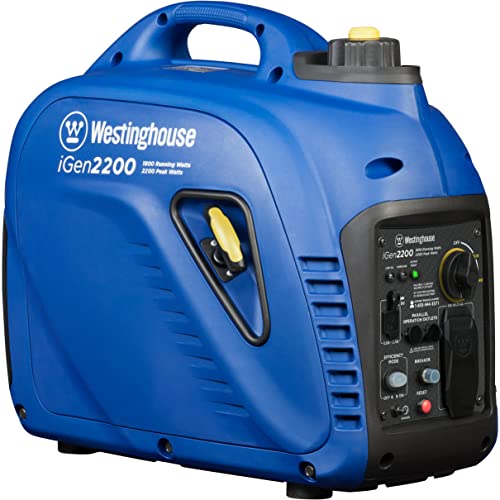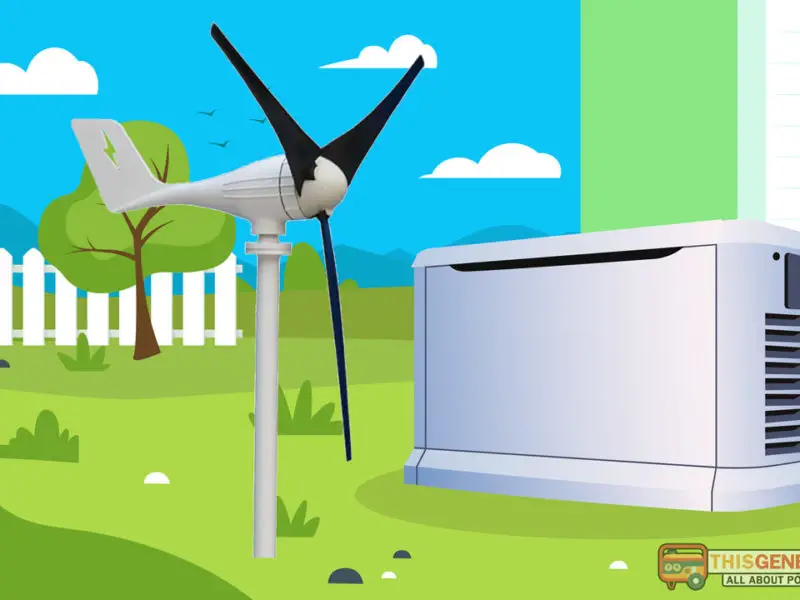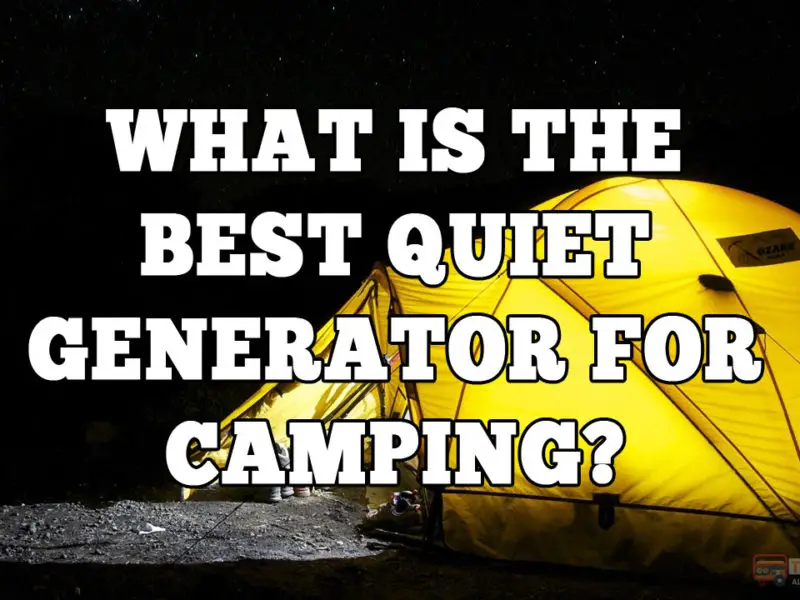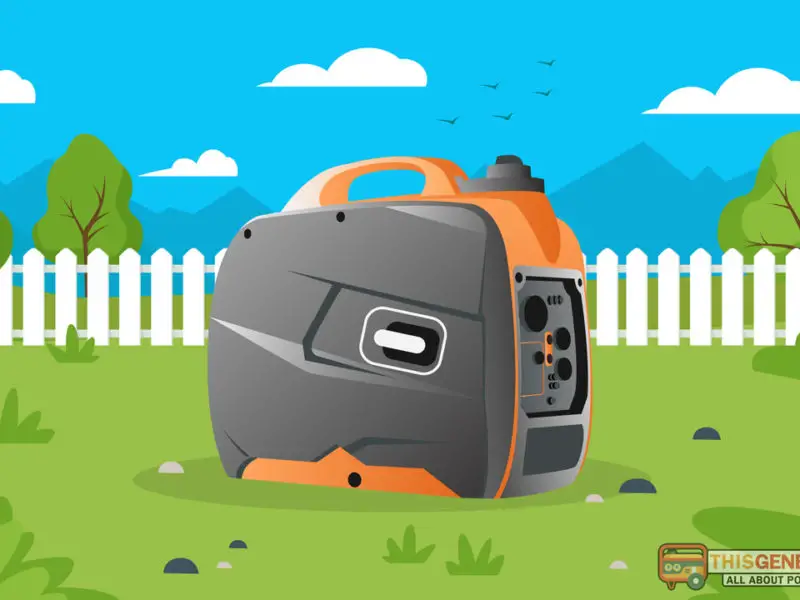So, you’re planning to purchase an electric generator. However, you’re not interested in a massive unit, such as a whole-home or standby unit. Instead, you’re looking for a smaller, portable generator, perhaps for the garage or for fishing.
First off, congratulations. You’ve made a great decision. A generator can be a lifesaver during power outages. Generators are also a convenient power source for everyday projects that require electricity, such as an outdoor party.
More importantly, you now need to find the best generator for your application. And that’s the hardest part. Read on to learn more about small portable generators, how to select one, sizing, and generator maintenance tips.
What’s a Generator and How Does it Work?
A generator, or power generator, is a piece of electrical equipment that uses fossil fuel to generate electricity. It does so by burning fossil fuel, typically gasoline or diesel, to produce mechanical energy. Then the generator’s engine converts the mechanical energy into electrical energy.
The process is long and complex. However, generally, the generator ignites and burns the gas in a combustion chamber, generating tons of mechanical power. The generator harnesses the mechanical power to move a piston in the engine, which then turns a rotating component of the engine, known as the rotor.
Rotating generator motors generate an electromagnetic field which is essentially millions of charged particles moving from one point to another in a closed loop. Generators only need to redirect the electrons to produce an electric current.
Most modern generators are inverter types that convert the original, unstable DC power into a stable 120V AC which you can use without adverse consequences or further modifications.
What’s a Portable Generator?
Portable generators are small generators that you can effortlessly move from one point to another. Portable units are usually contrasted with whole-home and standby generators which are bulky and large.
For instance, some portable generators are as light as 30 lbs. or less. The Honda EU1000i, for example, is only 29 lbs. Another very light model is the Yamaha EF1000iS that weighs a mere 27.9lbs. You can easily carry these units bring these units along. In fact, you may even carry it with one hand.
Meanwhile, standby and whole-home generators are very bulky. For example, the Generac 7043 Home Standby Generator weighs an incredible 515 pounds!
So, don’t confuse portability with power sizing. Although portable generators are also inherently low-wattage units, portability is all about weight and ease of mobility.
Considerations When Shopping for a Small Portable Generator
The following are four top factors to consider once you’ve set your mind on getting a small portable generator.
- Size (wattage)
The easiest way to determine the right-size generator is to consider the intended application. Why are you buying the generator? Do you want to use it in the garage? Are you looking for a way to run outdoor events in the summer? You may only need 500 watts for some of these applications.
However, it’s advisable to find a generator at least 20% more powerful than your total wattage needs. This will help once the generator loses some power as it ages.
- Fuel type
Generators generally operate on gasoline or diesel. So, which is better? The answer is – it depends. Gasoline is more affordable than diesel. Most people also love it because gasoline engines are simpler and easier to repair. The replacement parts are also more affordable.
However, diesel produces more power per unit volume, meaning you need less diesel to hit the same targets. Secondly, diesel burns cleaner, with fewer carbon emissions, though the difference isn’t big. The good news is that you can now opt for a dual-fuel generator that uses any of the two fuels.
- Tank size and depletion time
Beyond the wattage capacity and fuel type, you also need to consider the size of the tank and how long the generator can last on a full tank. So, it uses gasoline and generates 1,000 watts per hour. But, how much fuel does it hold, and how long can the generator run on a full tank?
Most small portable generators hold between one and two gallons of fuel. However, the smallest models may hold just under a gallon of fuel. Depending on the generator type, a gallon of gasoline can last up to 12 hours at 25% of the load.
- Inverter generators and THD
Generators primarily produce unstable direct current (DC). Unfortunately, most home appliances don’t use DC. Although some light bulbs accept DC, devices such as laptops, phones, the TV, and home theaters cannot process DC and may even get damaged when connected to DC power.
So, you should consider two things. First, consider generators with very little Total Harmonic Distortion (THD). These are “clean power” generators. You want to aim for 6% or less THD. Additionally, we recommend inverter generators that automatically convert DC to AC.
- Start type
You can start a generator in two main ways – by pulling a recoil cord or pushing an electric start button. Traditional generators use the recoil cord, typically located at the back or right side of the generator. You hold the coil’s handle and pull quickly to start the generator. Typically, it takes two or three pulls to start the generator.
Meanwhile, electric start generators are a lot more convenient. You just push the start button, and the equipment roars to life. The choice is yours. But electric button starts are a lot more convenient, though you need to charge the battery regularly and later replace it.
- Noise level
Another critical consideration is the noise output. Smaller generators are generally quieter. However, that doesn’t mean that they are all as quiet as you’d want. For example, a few models produce over 70 decibels, which is a little too high. We recommend shopping in the 50dB to 55dB range.
It also depends on the intended use. If you’re buying a generator for hiking, you can make do with a slightly noisier unit.
- Other considerations
Finally, we would also recommend that you consider the number and types of outputs, including USBs, whether the generator has a handle and wheels for mobility, and whether it has a lifting hook. A few models also have a carbon monoxide sensor that automatically shuts down the generator in case of oxygen depletion in a closed room.
Of course, you must also consider the price and whether the unit has a warranty. Small portable generator prices range from around $600 to $2,500.
Product Reviews
Now, let’s look at some of the best smallest portable generators based on the above considerations. We’ve only selected from the industry’s best brands.
Champion 3400-Watt Dual Fuel Ready Portable Inverter Generator
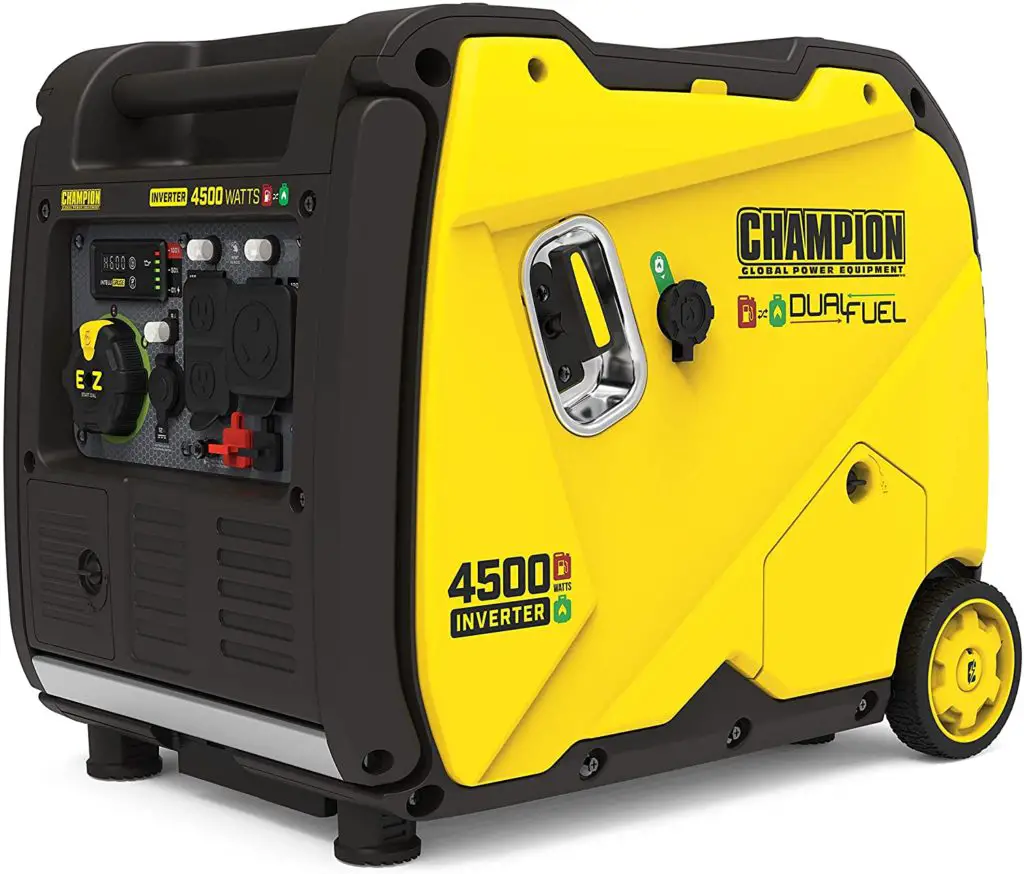
Pros
- Dual-fuel capability
- Super quiet at 59dB
- Electronic start
- Parallel link kit
Cons
- A tad expensive at over $2,000
- A bit bulky at 110lbs
Let’s kick off with one of the best portable generators money can buy today – the 3,400-watt unit from Champion. This dual fuel generator can run on either propane or gasoline. The best part is that you don’t need further adjustments to switch from one fuel to another.
Additionally, this is an inverter generator that generates clean power. So, you don’t need a separate inverter to power home appliances, such as the TV and charging your phone. A 120V, 30A circuit makes it easy to power your devices. Additionally, it has a 120V 20A outlet, a 12V DC outlet, and a USB adapter.
This Champion maxes out at 59dB and utilizes an electric start for your convenience. Above all, it comes with a Para Link parallel kit so you can connect two or more units to power larger applications. A mobility kit is included if you feel it’s too heavy to carry by hand.
- Dual Fuel – Operate your 3400-watt portable generator right out of the box on either gasoline...
- Convenient Electric Start with 3-Position Ignition Switch – Battery included, plus Quick...
- Ultra-Quiet Operation – 59 dBA is perfect for RVs, tailgating, your next project or backup...
A-iPower SUA4000i Portable Inverter Generator
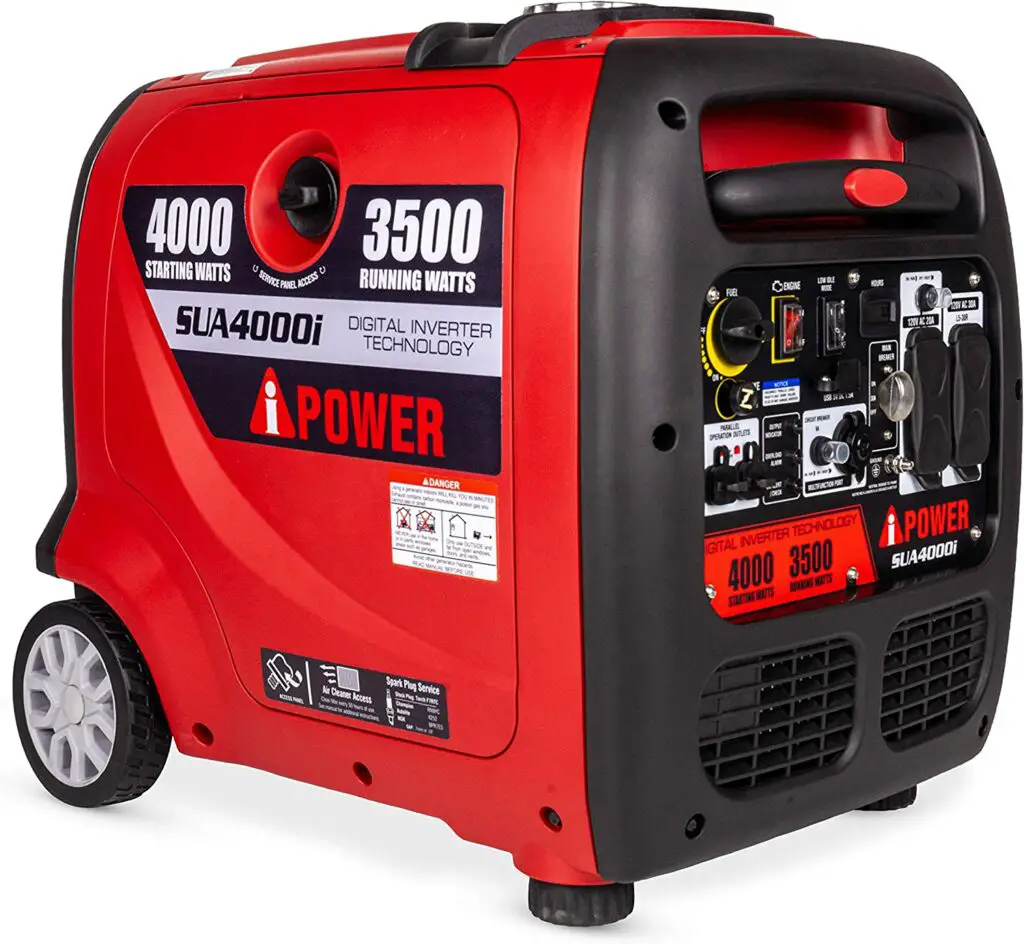
Pros
- Extra powerful at 4,000 watts
- Multiple outlets for convenience
- Mobility kit built-in
- Extremely fuel-efficient
Cons
- A bit bulky
- It’s a bit loud
Alternatively, you can opt for an even bigger generator while keeping the costs down. If that’s your goal, you should consider the model SUA4000i from A-iPower. At 4,000 watts, it’s one of the most powerful units on this list. However, it’s only priced at around $700, which leaves you wondering whether there’s a better deal out there.
Besides the raw power, the model SUA4000i boasts several innovative features for increased convenience and ease of handling. For instance, it uses “low idle” technology to keep the unit running longer. Typically, the unit runs for five hours on 100% load but can remain operational for up to seven hours on 50% load thanks to low idle.
We also love that it has multiple outlets. Although you’ll mostly need the two 120V 30A outlets to power your home appliances, it also offers a 120V 30A outlet, a 12V DC outlet, and two USB ports. An on-board hour meter makes it easy to track your fuel usage and plan for refills.
- Produces 4,000 starting watts with 3,500 running watts of clean and safe power for sensitive...
- Complete with A-iPower’s “Low idle” technology for an extended run time of 5 hours at...
- Equipped with a low oil alert light and low oil automatic shutdown, helping keep your generator...
WEN 56235i Super Quiet 2350-Watt Inverter Generator
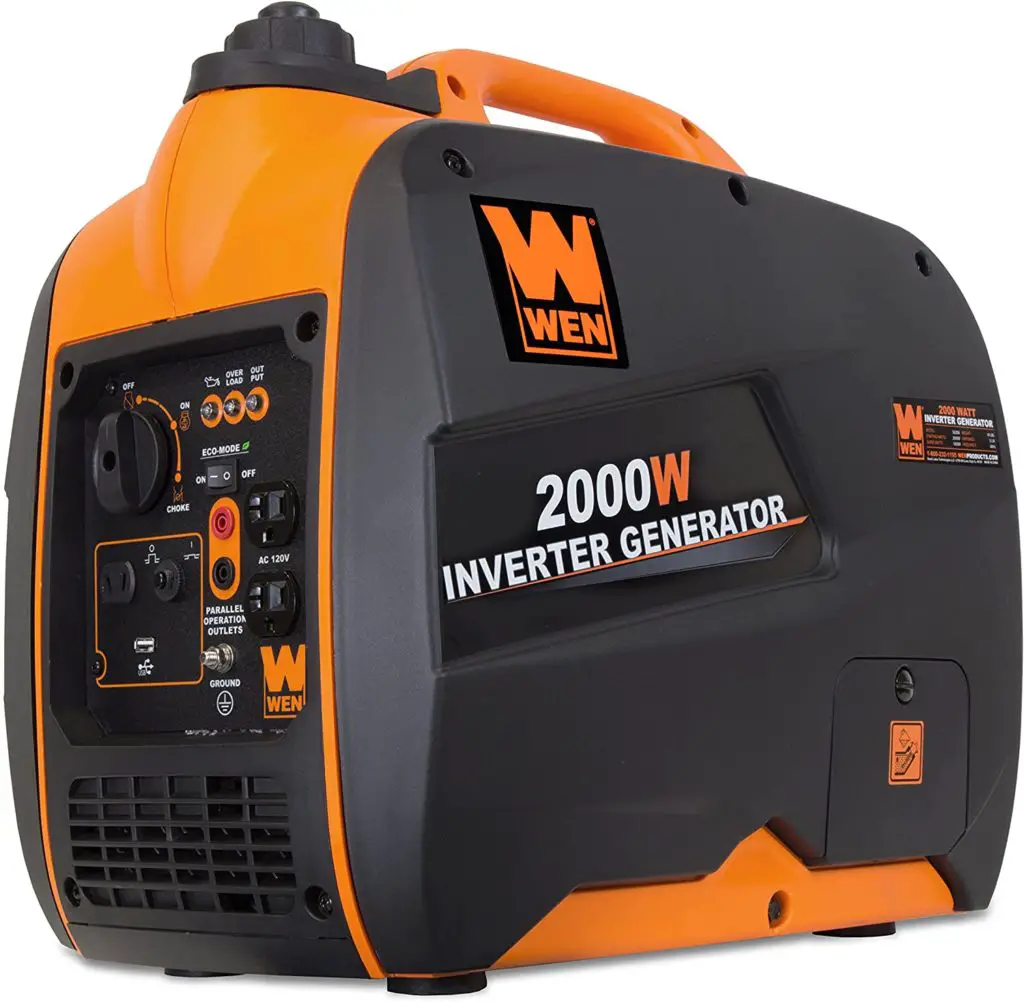
Pros
- Very lightweight at only 39lbs.
- The one-gallon tank lasts up to 10.5 hours
- Fuel auto-shutoff prevents engine damage
- Reasonably priced at around $700
Cons
- No paralleling feature
- Grounding wire sold separately
If you don’t need 3,000 watts and thus would be happy to find an even smaller generator at a lower price, the model 56235i from WEN is an excellent option. It generates 2,350 watts at peak voltage. Although this is about 1,200 watts fewer than the Champion generator above, it’s more than enough for typically low-load applications such as running an outdoor party or event.
The inverter generator weighs about 39lbs, making it one of the lightest on this list. It means you can easily carry it from one point to another with one hand. The ergonomic handle makes carrying effortless. The one-gallon tank lasts up to 10.5 hours at 25% load. An LED indicator will let you know low oil, overload, and output status.
Other key features of the WEN 56235i include multiple outlets and an auto fuel shutoff switch. The control panel has two 120V 15W outlets and two USB ports (1A and 2.1A). It also has a 12V DC outlet. The fuel auto-shutoff feature ensures the generator uses up all fuel from the carburetor before the engine shuts down to prevent engine damage.
- Ultralight body weighs in at a mere 39 pounds for easy transport and storage.Engine Speed :...
- Extremely quiet operation comparable to the sound of a normal conversation according to the US...
- Produces 2350 surge watts and 1900 rated watts of clean power for safe charging of sensitive...
Westinghouse iGen2200 Super Quiet Inverter Generator
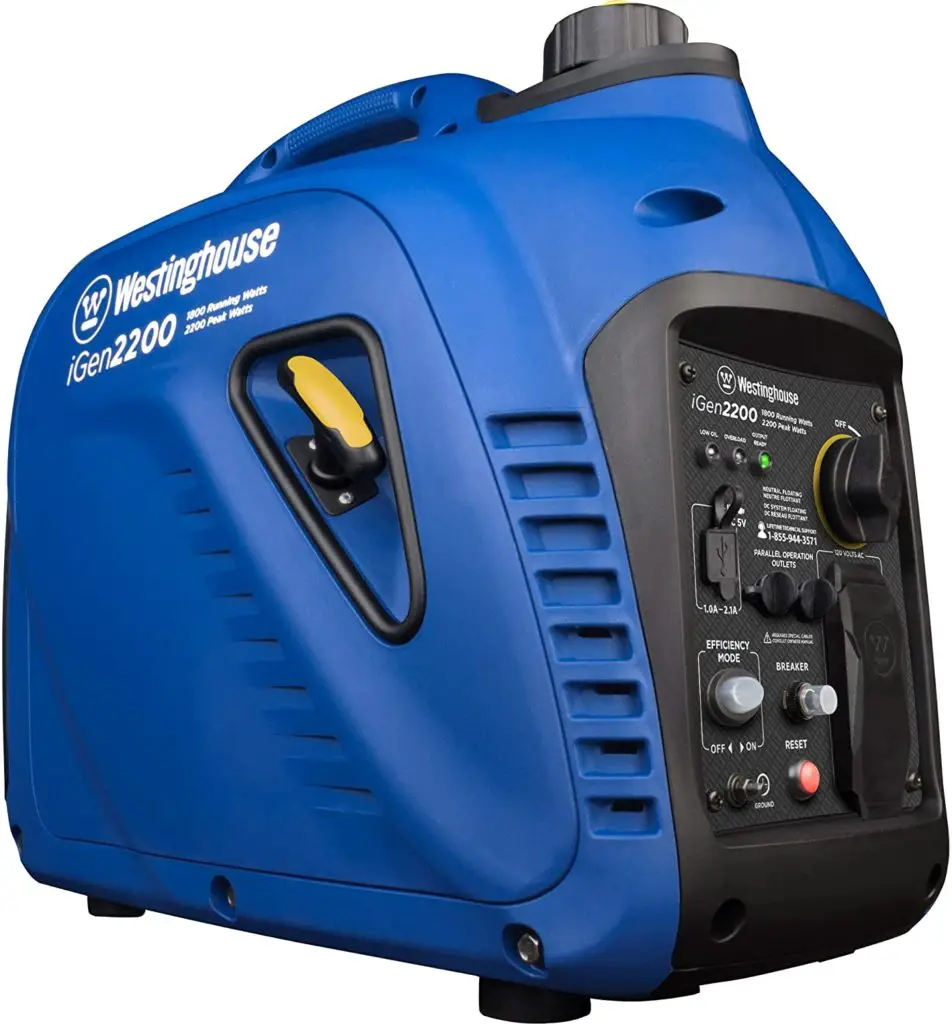
Pros
- Large 1.2-gallon fuel tank
- It runs for up to 12 hours on a full tank
- Very quiet at 52dB
- Paralleling-ready
- Priced under $500
Cons
- No DC outlet
- Paralleling cable sold separately
The iGen2200 generator from Westinghouse generates 2,200 watts at peak operation and about 1,800 when running normally. That’s more than enough to power most appliances. It’s a gas-powered generator and weighs about 46 lbs., which is also excellent considering its power rating. We also love that it starts quickly and runs cleanly.
As the name says, this is an inverter generator that produces clean sine waves. So, you don’t have to worry about getting an inverter separately. Two 120V 20A outlets make connecting the unit to your appliances easy. It also has a USB outlet, so you can charge your mobile phone and other devices directly.
Another key feature of the iGen2200 is the parallel connection kit. The only downside is that you must purchase the paralleling cord separately. The unit is rated 25dB, which is excellent, and can run for up to 12 hours at 25% load.
- 1800 Rated Watts and 2200 Peak Watts at Less Than 3% THD - Weighs Only 47.4 Lbs. - Gas Powered...
- Great Choice for Home Use as an Emergency Backup in a Power Outage - Strong Enough to Run All...
- Extremely Quiet, Extremely Fuel Efficient: as Low as 52 dBA Noise Output and 12 Hour Run Time...
Briggs & Stratton P2400 PowerSmart Generator
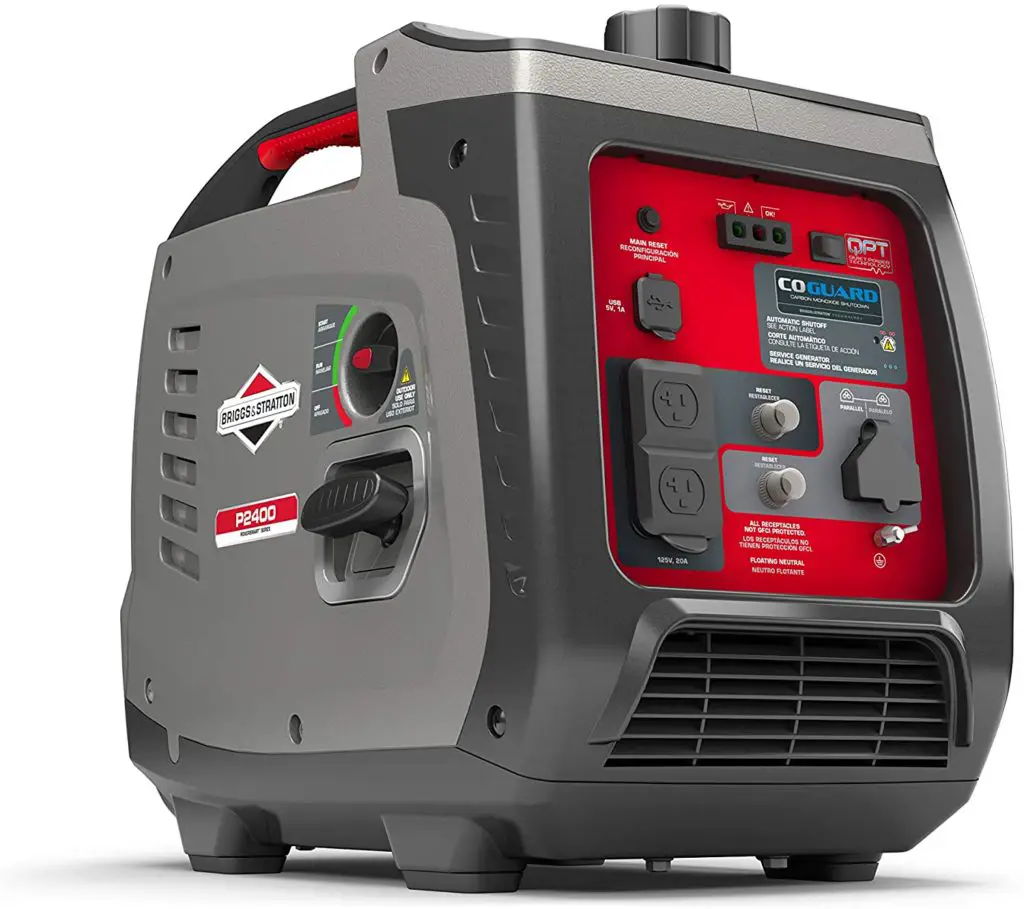
Pros
- Large 1.5-gallon tank
- Reasonably quiet at 60dB
- RV-ready design
- 3-year manufacturer warranty
Cons
- Manual start (not electric)
- Relatively low runtime (7.5 hours)
You’re probably aware that Briggs & Stratton makes some of the best power generators. It’s a massive brand name with millions of loyal customers globally and multiple product lines to choose from. However, we particularly recommend the P2400 Power-Smart generator if you’re shopping for a small portable generator.
The P2400 Power-Smart generator is a 4-stroke engine generator that runs on gasoline. However, the compact design and range of controls particularly stand out. At 20.4 x 12.24 x 17.36 inches, it’s one of the most compact generators on our list. It also weighs just 58 pounds.
It’s a recoil-cord generator with a 1.5-gallon fuel tank, one of the largest on this list. The tank can run for 7.5 hours straight at 25% load. You’ll also appreciate that it has up to five (5) USB ports. Few generators have more. Two 120V outlets besides the USB ports mean you can conveniently power your appliances. The manufacturer offers a 3-year warranty.
- Convenient Monitoring System - Features LED lights for low oil and overload alerts.
- CO Guard Carbon Monoxide Shutdown Technology - Shuts down the generator when harmful levels of...
- Safe for Sensitive Electronics - With inverter technology, it produces smoother power for...
Power-Smart PS50A 1000-Watt Gas Generator
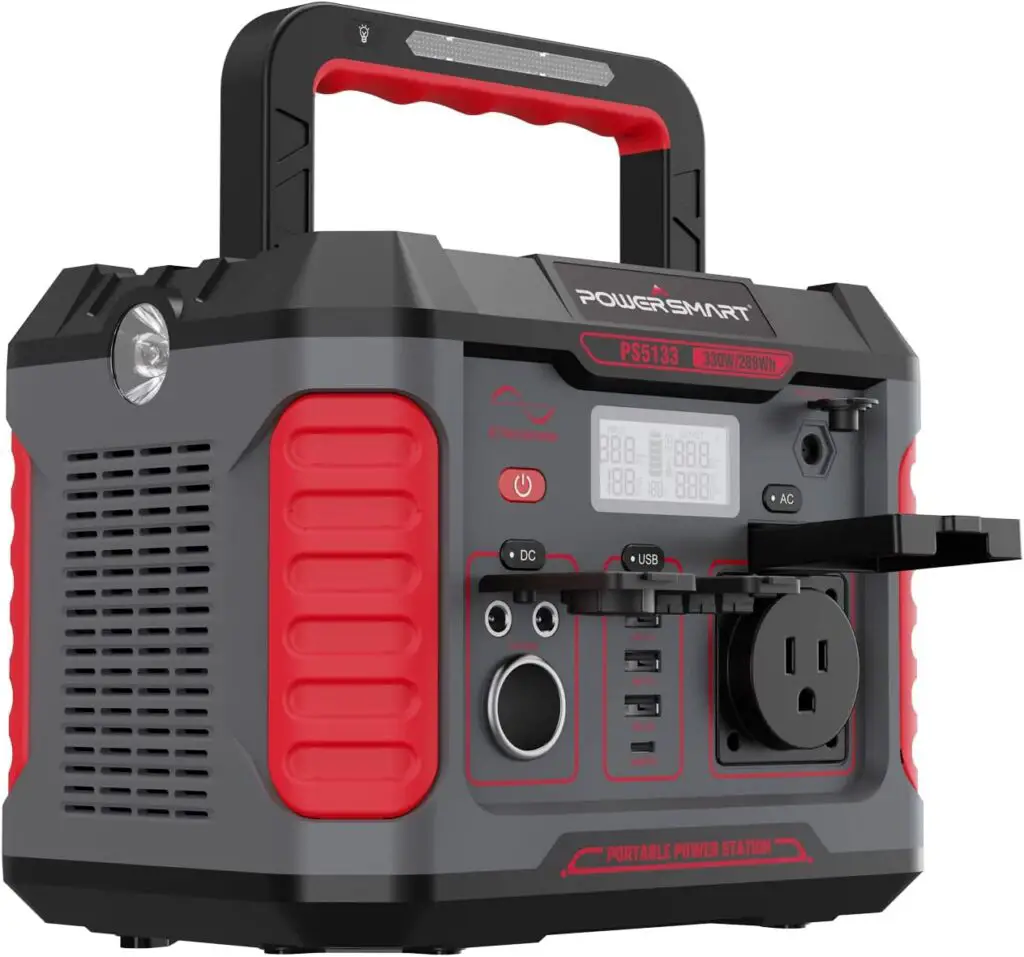
Pros
- Very affordable at under $200
- Large 1.1-gallon tank
- Very lightweight at 39lbs.
- Wide range of applications
- 2-year manufacturer warranty
Cons
- No USB outlets
- Requires fuel mixes
- Short lifespan
Finally, today, one of the smallest portable generators is the 900-watt to 1,000-watt PS50A from Power-Smart. It’s a little different from the other five generators above. However, it’s both more compact and more affordable. We also love that it’s rugged enough for hiking, camping, and similar applications.
For one, it’s a 2-stroke engine. Two-stroke engines complete the power generation process in just two cycles, unlike four-stroke engines that require four strokes. A significant advantage of two-stroke engines is the price. Two-stroke engines are generally more affordable than their four-stroke counterparts. Unfortunately, you need to mix fuels with oils, such as when using a chainsaw.
The generator is super lightweight, weighing just 39 lbs., and comes with a 1.1-gallon tank that can run for up to five hours at 50% load. Its outlets include a 120V AC plug and a 12V DC outlet. It comes with a 2-year manufacturer warranty.
- Power All Your Essentials: The high-capacity lithium-ion battery pack pumps 288Wh of power. It...
- Light & Portable Backup Power Source: Package dimensions 10.9"× 9.5" ×8.9", weights 8.6lbs....
- Safe & Steady Power Supply: Armed with Pure Sine Wave AC outlets that deliver stable and safe...
FAQs
- How long can a small generator run? Small portable generators can run for up to 16 hours on a full tank, depending on the generator. However, most units run for 7.5 hours to 10 hours on a 50% load.
- How do you maintain a small generator? Run the generator at least once every few months, check the fuel lines regularly, replace/clean dirty filters, and check in on the spark plugs.
- How much ventilation does a portable generator need? According to the Occupational Safety and Health Administration (OSHA), you need 3-4 feet of clear space on all sides and above the generator.
- How many watts do you need to run a refrigerator? The standard home refrigerator uses 350 to 400 watts per hour. So, if you’re wondering, yes, you can operate the fridge using a generator.
- Can a generator explode? Yes, a generator can explode. Delicate parts of the generators such as the brush, armature, and communicators can spark and ultimately explode without proper maintenance.
- Do generators need rest? Yes, generators tend to heat up, especially after running for several hours. This is especially true for small, portable generators. So, it would be best if you let it rest at least a few hours a day.
Conclusion
Small, portable generators can be lifesavers when grid power goes out. Additionally, the portable generator can be extremely valuable when camping or fishing. So, it makes every sense to invest in one.




